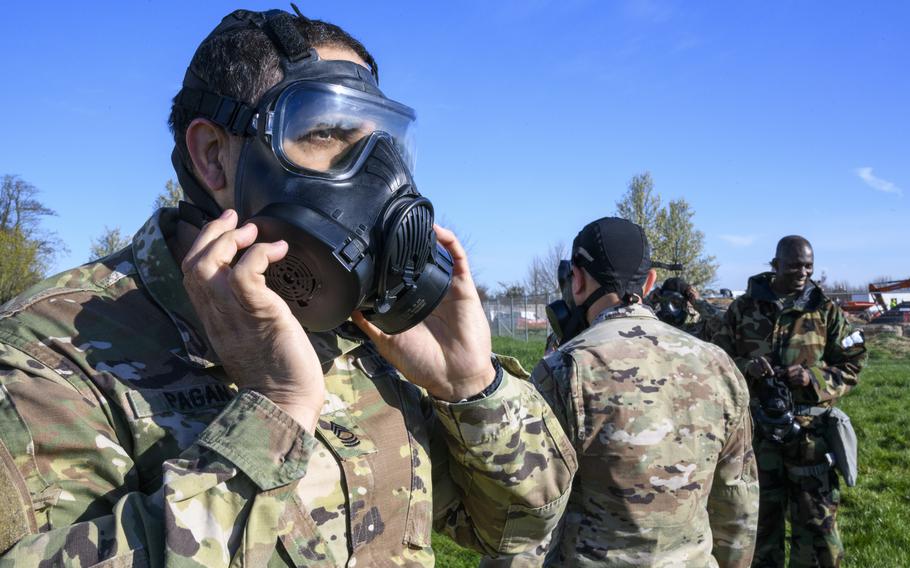
Army Master Sgt. Carlos Pagan adjusts his mask as part of Chemical, Biological, Radiological, Nuclear defense training in April 2023. (Pierre-Etienne Courtejoie/U.S. Army)
The Army will slash nearly one dozen mandatory training programs for its soldiers in the summer as it looks to streamline their time to focus on combat readiness tasks, service officials said.
The Army will drop two long mandatory training requirements for soldiers and make six other online and in-person training programs optional at the discretion of unit commanders, according to a draft version of the Army’s training and leadership development regulation, AR 350-1, which was published Monday. The new regulation is expected to be made official June 1 and will leave soldiers with 17 remaining mandatory training requirements, according to the service.
Gen. Randy George, the Army’s top general, has made cutting down the time that soldiers spend conducting mandatory training a top priority since becoming chief of staff in September 2023. The new cuts come after George last year ordered a reduction in some 350 hours of annual mandatory online training for troops.
“The updated regulation marks a significant step toward simplifying training requirements while enhancing warfighting readiness and effectiveness across the force,” the Army said in a statement. “In addition, it will remove administrative burdens and unnecessary distractions, allowing soldiers to focus on essential warfighting skills.”
The updated regulation marks the first major overhaul of the mandatory training program since 2017, and it cut the length of the published regulation from more than 250 pages to 132.
The new regulations leave it to commanders to determine whether their soldiers need to complete training in six categories:
• Chemical, biological, radiological and nuclear, or CBRN, training at the individual or unit level.
• Combat Lifesaver Training, which provides nonmedical troops basic level training to assist casualties until medics or other medical professionals arrive.
• Safety and occupational health courses, including basic risk management training and traffic safety courses for soldiers younger than 26 years old.
• Law of War training, which provides soldiers basic ethics on the battlefield.
• Code of Conduct training, which trains troops on the ethics that they are expected to uphold in uniform.
• Online personnel recovery and survival, evasion, resistance and escape, or SERE, courses, which train troops to avoid capture by the enemy and how to survive if they are taken by hostile forces.
Some of that training will remain mandatory for certain types of troops, according to the Army. CBRN training will remain mandatory for all soldiers with CBRN jobs or serving in CBRN units, for example.
“These revisions aim to alleviate the burden on commanders by granting them greater flexibility in customizing training schedules to meet specific mission requirements,” Army officials said. “The new regulation eliminates restrictions on the duration and locations of certain training events and encourages alternative methods of training delivery.”
The new regulation fully scraps the Army’s Resilience Training and its Structured Self-Development programs, which the service labeled “outdated.”
Resilience training was a classroom program focused on providing soldiers with coping mechanisms and stress reduction practices, but it had long faced criticism among top officials for failing to curb suicide rates in the service.
The Structured Self Development course was an online training program that provided enlisted soldiers education about their roles as they moved up in rank.
Army officials, in the statement, said the coming training changes would ensure soldiers are “better prepared for real-world missions while reducing nonessential requirements that can detract from operational effectiveness.”